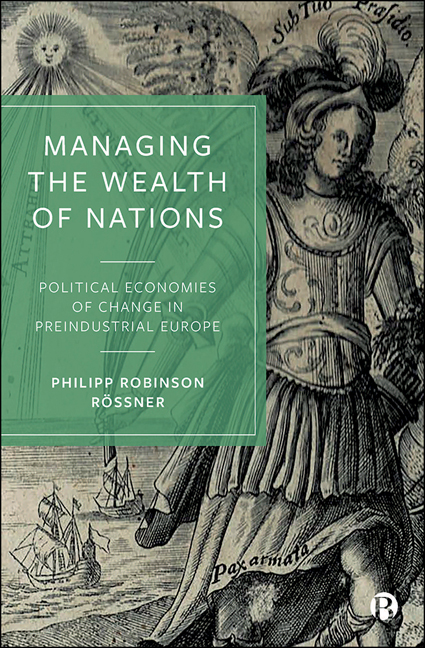Book contents
- Frontmatter
- Contents
- List of Figures and Tables
- Acknowledgements
- 1 Inventing Dynamics: Political Economies of Money, Markets and Manufacturing, 1300s–1800s
- 2 Governing the Future: Capitalism’s Early Modern Temporalities and the Origins of Growth
- 3 The Myth of the Myopic State: Governing Economy and the Politics of Economic Change, 1250s–1850s
- 4 Configuring Free Markets: A Deeper History of Laissez-Faire
- 5 Money and the Rise of Modern Capitalism
- 6 Velocity! Money, Circulation and Economic Development, c.1250–1850
- 7 Creating Wealth: Homo Manufacturabilis and the Wealth of Nations
- 8 Manufacturing Wealth: Industrial Policy and the Rise of the European Economy, 1350–1850s
- Epilogue: State Capacity and Capitalism from Cain to Keynes: Money, Markets and Manufacturing
- Notes
- Index
4 - Configuring Free Markets: A Deeper History of Laissez-Faire
Published online by Cambridge University Press: 17 January 2024
- Frontmatter
- Contents
- List of Figures and Tables
- Acknowledgements
- 1 Inventing Dynamics: Political Economies of Money, Markets and Manufacturing, 1300s–1800s
- 2 Governing the Future: Capitalism’s Early Modern Temporalities and the Origins of Growth
- 3 The Myth of the Myopic State: Governing Economy and the Politics of Economic Change, 1250s–1850s
- 4 Configuring Free Markets: A Deeper History of Laissez-Faire
- 5 Money and the Rise of Modern Capitalism
- 6 Velocity! Money, Circulation and Economic Development, c.1250–1850
- 7 Creating Wealth: Homo Manufacturabilis and the Wealth of Nations
- 8 Manufacturing Wealth: Industrial Policy and the Rise of the European Economy, 1350–1850s
- Epilogue: State Capacity and Capitalism from Cain to Keynes: Money, Markets and Manufacturing
- Notes
- Index
Summary
Moral debates in the age of the free market, 1890s
In 1888, a ravaging debate took place in the Munich Landtag (the Bavarian state Diet) concerning pedlars and hucksters. Hucksters had mushroomed across the Bavarian countryside. They went from house to house, offering cheap and shoddy goods (Ausschussware). Purchasing from the manufacturer (Fabrikant), they pressed these goods on to the rural customer. The latter, poor souls that they were, unbeknownst and often illiterate, for reasons of sheer fear often simply gave in, hoping the pedlar would then move on harassing the next-door neighbour instead. The poor were forced to ‘buy to their detriment’, because they were too afraid of the pedlar's revenge in case they insisted on a firm ‘no’ to the offered deal (kaufen lieber zu ihrem Schaden, … nur aus Zwang …, um der Hausirer los zu werden, weil sie die Leute furchten, voll Angst und Schrecken sind, und um sich von den peinlichen Plaggeistern und deren Rache zu befreien). The hucksters began with charming and praising their goods. If that were to no avail they would turn to swearing and threats, and, finally, if that didn't help … begging! The source went on to lament the ‘ferocious and dangerously cancerous phenomenon’ that consumed rural society from within. It had to be weeded out (Der verwilderte und gefahrliche Krebsschaden und Auswuchs, die Schmarotzerpflanze, die dem seshaften ehrlichen Burger allen Lebenssaft entzieht, zerstort, frist und schlieslich todted und das Landvolk vollends ermattet). This rhetoric set a dangerous precedent for later, unholier ages, especially when directed against Roma and Jews.
Interestingly, in the present case the itinerant hucksters served as the prolonged arm of the capitalist-manufacturer or Fabrikant and wholesaler (Grossist). But by their shoddy selling and nature, they acted to the great detriment of the common weal. Such debates were not at all uncommon at the time. They never really had been. Justus Moser (1720– 94) in his Patriotische Phantasien picked up on the dubious nature of sales ‘forced’ by the hucksters upon the innocent country people. For centuries pedlars and hucksters had represented a common social stereotype in discourses on the common weal, the welfare of the nations, and the role played by markets. Medieval market theory had regrating – peddling or huckstering writ large (= reselling) – as a potentially incriminatory activity, dangerously close to usury. Early modern political economy remained similarly negative on peddling.
- Type
- Chapter
- Information
- Managing the Wealth of NationsPolitical Economies of Change in Preindustrial Europe, pp. 70 - 99Publisher: Bristol University PressPrint publication year: 2023



